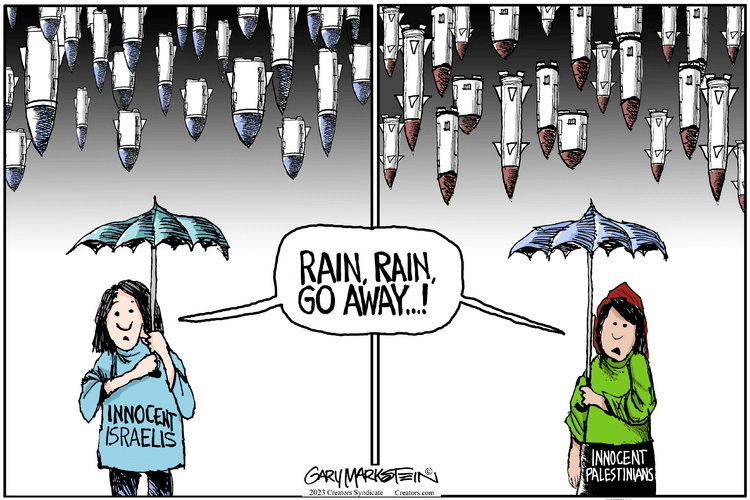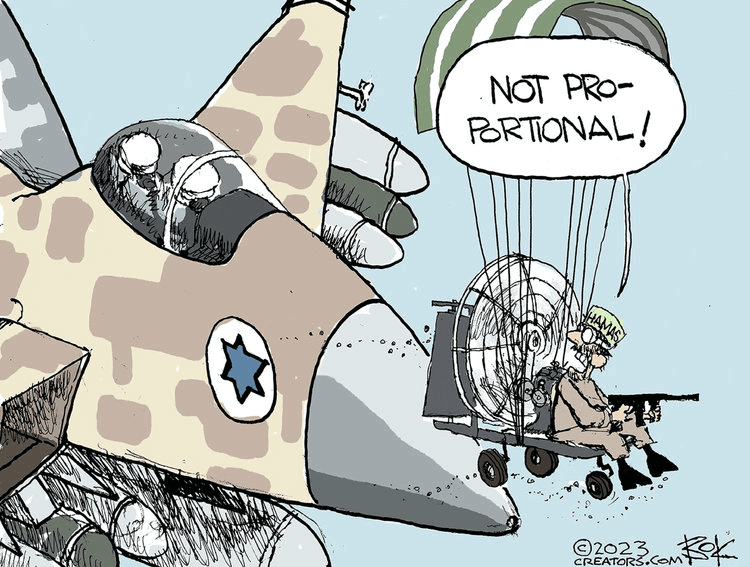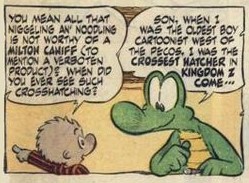CSotD: Identifying the Usual First Casualty
Skip to comments
Well, of course it is, David Rowe, but thank you for pointing it out, since we don’t seem to remember, or perhaps care.
The idea that “Truth is the first casualty in war” is such a common observation that it makes a fascinating entry for the Quote Investigator, but, appropriately, is a casualty of its own obviousness.
So many people have said it so many times that it’s more of an adage than a quote.
What makes the examination interesting is not how often it’s been said but the variations of circumstances.
One of the most celebrated uses comes from Sen. Hiram Johnson, who said in 1929:
The first casualty when war comes is truth, and whenever there is a war, and whenever an individual nation seeks to coerce by force of arms another, it always acts and always insists that it acts under self-defense.
And if that doesn’t seem to have a sting in light of the current circumstance, we can go back to the actual quote from Aeschylus which appears to have touched off the whole thing:
God is not averse to deceit in a just cause.
It hardly matters who said it first, and it certainly doesn’t matter to the dead on either side.
But their survivors, in their grief, seek answers, not philosophy, and there’s always someone willing to provide an answer.

Martyn Turner addresses the overall matter, casting blame on both sides, which makes me wonder if being Irish, and having witnessed the phenomenon before, influences his take on it.
As was the case during the Troubles there, people try to explain the terrorists’ motivation, but only a few fringe-dwelling extremists try to justify their actions.
It doesn’t matter: Even well-grounded explanations are taken as excuses and brushed away as pro-terrorist sentiment.
Turner avoids the trap by not addressing cause but only documenting the moment, on both sides, without evaluating either.
He doesn’t offer a solution, mind you, but perhaps there isn’t one.

In this country, Gary Markstein (Creators) joins a chorus of cartoonists decrying the impact on children of both sides, which was a good point early on but has begun to lack any punch, as attention shifts and begins to focus, as Turner has, on those creating those regrettable deaths and injuries.

Phil Hands is taking sides against Hamas, which is hardly a radical stance, but his including a Palestinian among the victims is undercut by the question of whether anyone in Gaza or the West Bank has been enjoying prosperity, while he also raises a serious issue by asking if they had been experiencing peace.
He’s not wrong to blame Hamas. They are — absolutely — to blame for the attacks. But this seems to come late in the game. Things have moved on and we’re now in a more complex discussion of how Israel, and the world, should respond.

Chip Bok (Creators) takes the position that there is no requirement for proportional response, which might make sense if Israeli air strikes were hitting only Hamas members.
And if there were not an absolute declaration of the principle of proportionality in both the Geneva Accords and the Just War Theory.
Coming out against Hamas is an obvious stance. Coming out in favor of war crimes, however, is less easy to defend, and the civilian death toll in Gaza is now roughly double that inflicted by the terrorists in the original attacks.

Commenting from Australia, Fiona Katauskas questions the potential for proportionality in an attack upon a target crowded by civilians who are unable to evacuate.

While another Aussie, Matt Golding, is similarly dismissive of the notion that attacking a civilian area can be considered a proportional response.
It’s worth bearing in mind that, in the 2006 elections which brought Hamas to power, they only received 44.45% of the vote. It’s also worth bearing in mind that Israel is being run under a coalition government, Netanyahu’s Likud Party having won less that a quarter of the seats in the 2022 elections.
Neither side has an unassailable mandate; both have a considerable body of dissenting civilians.

British cartoonists like Peter Brookes seem willing to blame Netanyahu, though not Israel in general, either for the assumption that all Palestinians are Hamas sympathizers, or simply for taking the war to a crowded area where the likelihood of collateral damage is obvious.
As to whether that hospital was hit by an Israeli or a Palestinian missile, the argument that Hamas is a noted source of self-serving falsehoods has been undercut by, for instance, the killing of popular reporter Shireen Abu Akleh, which was denied by the Israel Defense Forces for four months, after which they admitted to the killing but said it was accidental and nobody would be punished.
There is such a thing as “fog of war,” but it can be artificially generated. Observers may be forgiven for believing half of what they see and none of what they hear.

Some of us are old enough to remember a time when that fog never cleared, nor was really expected to.
Before the Internet made geniuses of us all, North Vietnam claimed US bombers hit a hospital, the US claimed there was an anti-aircraft gun on its roof and nobody, AFAIK, ever came up with a verified explanation. The caravan had moved on.
War was a great deal easier before communications opened things up. The Crimean War was the first major conflict in which the telegraph allowed the folks back home to know that someone had blundered.
Ah, for the good old days!

Morten Morland suggests that Netanyahu has far less of the world’s support at the moment than Winston Churchill enjoyed against the Axis, as seen in a classic David Low cartoon from 1940.

Juxtaposition of the Day


You’ll have to forgive Americans who feel a certain sense of deja vu, remembering that nobody liked al Qaeda or defended the attacks of 9/11, but that the response seemed both disproportionate and illogical.
Though we hesitated to say so until we were committed to action.
Blame it on the fog.

As Dr. Macleod suggests, this is simply a case of “Fool us once, shame on you. Fool us over and over and over for the better part of a century, still shame on you because we possess the virtue of eternal hope.”
BYO lambs.
(Poet Wilfred Owen was killed in action in 1918, a week before the Armistice)

Comments 3
Comments are closed.